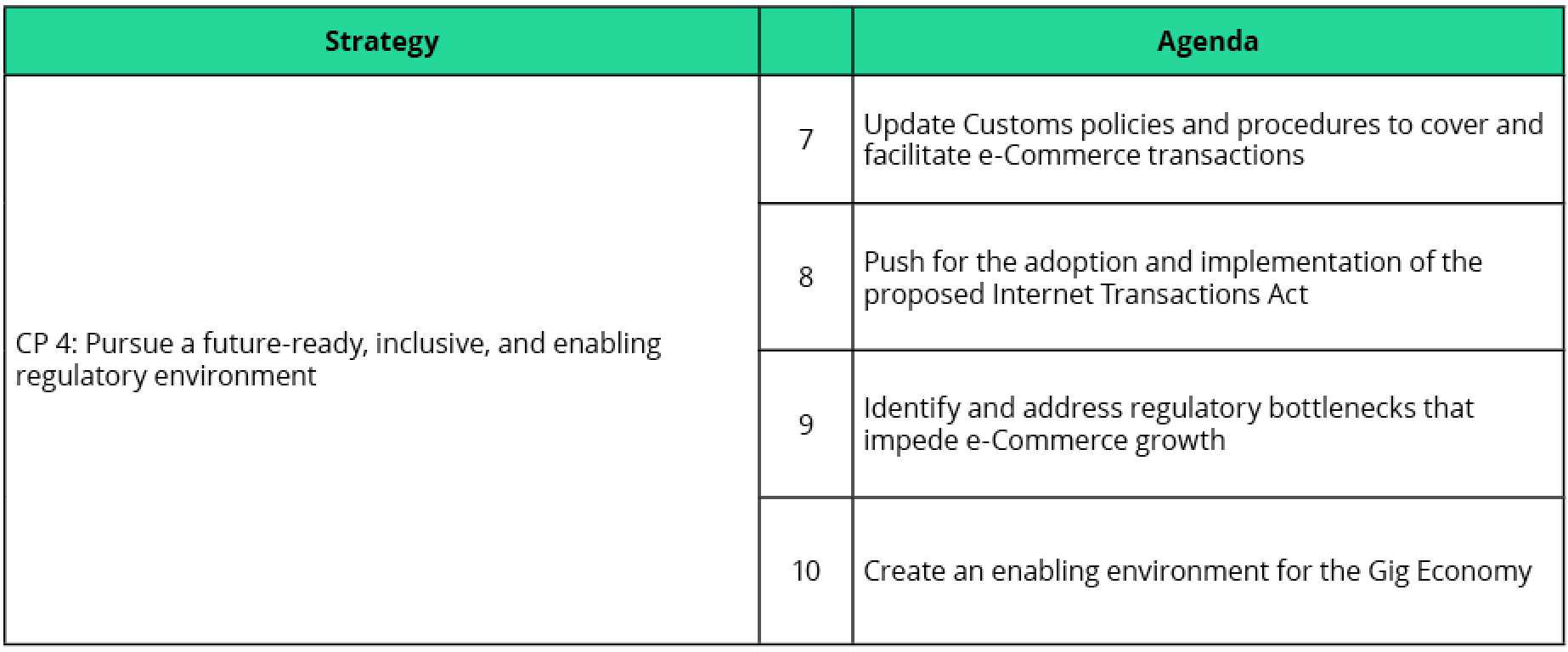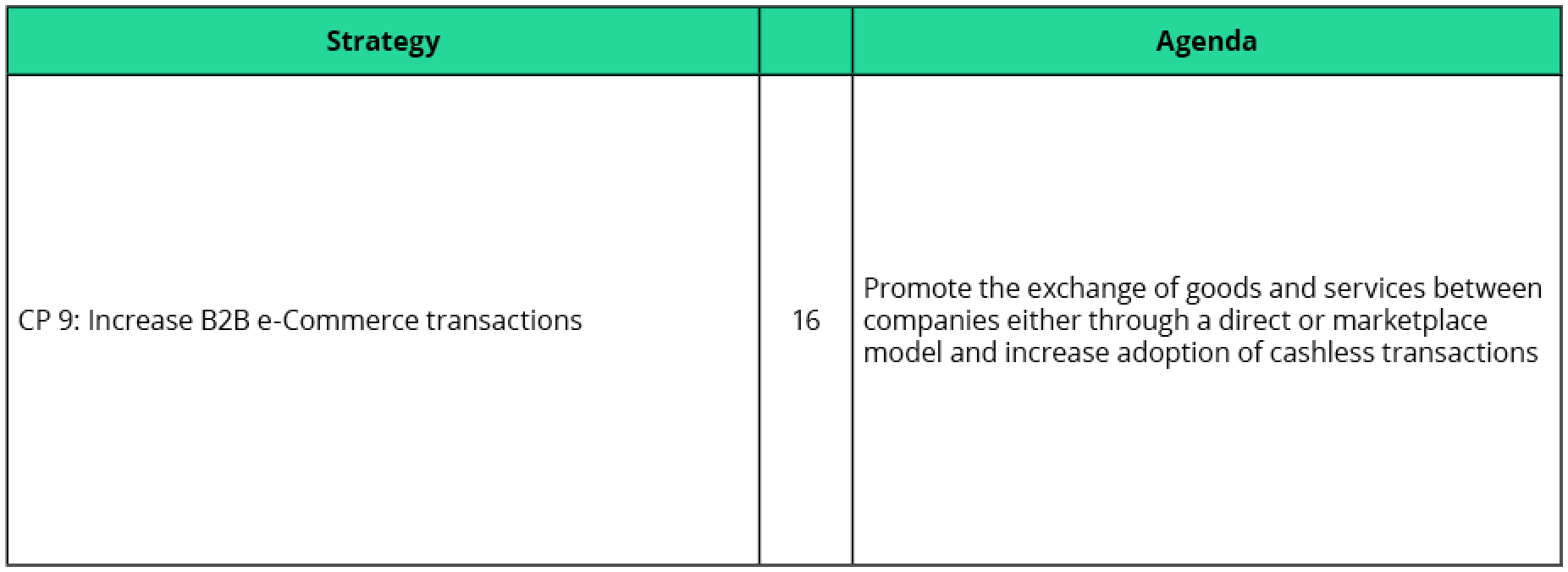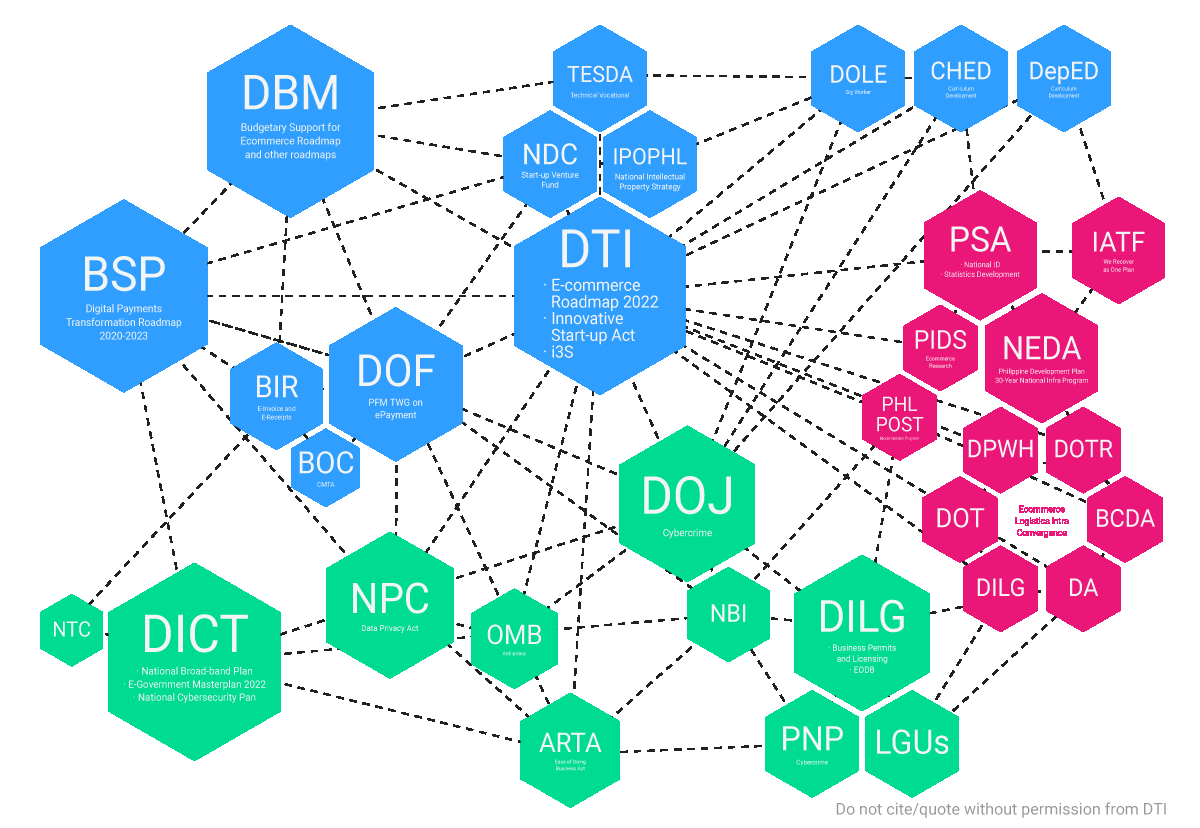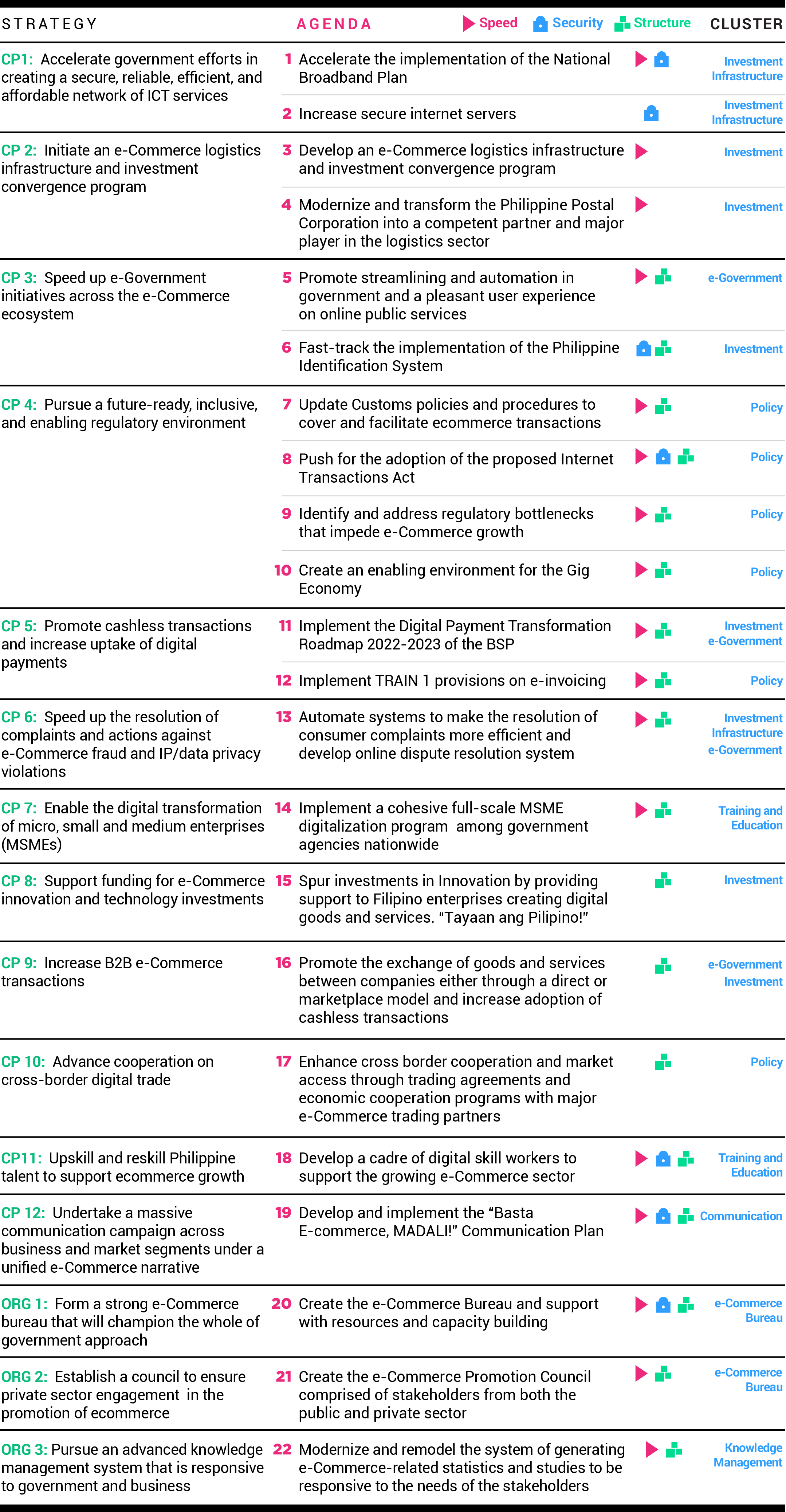MADALI 2022
22 for 2022
The DICT plays a lead role in accelerating government efforts towards creating a secure, reliable, efficient, and affordable network of ICT services. The implementation of the National Broadband Plan (NBP) and increasing the number of secure internet servers in the country have been identified as core activities to enable e-Commerce growth. According to the World Bank report, in 2020 the Philippines’ secure internet services (per 1 Million people) is valued at 114, significantly lower than Singapore (126,922), Thailand 1,908, or Malaysia 7,494).

Investments in logistics infrastructure is an important strategy in this roadmap. This includes both direct investments in infrastructure, such as warehouses, port development and upgrade, cold storage facilities as well as the modernization of the Philippine Postal Corporation (PHLPost), the primary body in charge of Philippine postal services. The convergence program will consider the feasibility of e-Commerce hubs and townships as well as transport & storage infrastructure and facilities, including related systems and software upgrades for improved logistics operations, in coordination with various logistics-related government agencies and industry associations.

With 10 years to 2030, the UN called for a Decade of Action, when governments, businesses, and individuals collectively mobilize to achieve the Sustainable Development Goals. A large part of this movement is driven by digital governments whose role is to deliver efficient and inclusive services to everyone. Hence, for this roadmap, our goal is to upgrade the Philippine government, not just to be a facilitator of business, but also to be one of the main participants in digital transactions. This will be done by implementing the e-Government Master Plan 2022, including compliance to RA 11032 or Ease of Doing Business (EODB) and Efficient Government Service Delivery Act particularly the creation of the Central Business Portal and Philippine Business Databank. There was a consensus that digital platforms, during the Key Informant Interview (KII) study conducted, advocated for the fast-tracking of the national ID system implementation which could greatly improve the Know Your Customer (KYC) process for various services.

E-commerce needs to be supported by a future-ready regulatory environment that provides a delicate balance between enterprise development and consumer protection. This will involve three things – (1) updating existing policies particularly those that are obsolete and no longer responsive to current times (2) creating new policies to align with global/regional practices and (3) creating a safer and more enabling environment for e-Commerce participants.

Improvements in digital payments are driven by the BSP through its Digital Payments Transformation Roadmap 2020-2023. Thus, the e-Commerce Philippines 2022 Roadmap supports the BSP’s thrust to promote financial inclusion and digitalization of payments because of its impact on e-Commerce. This Roadmap intends to contribute to BSP’s twin outcomes of (i) converting 50% of the total volume of retail payments into digital form, and (ii) Expanding the financially included to 70% of Filipino adults, by onboarding them to the formal financial system through the use of payment or transaction accounts. This will be achieved through a massive information and education campaign to promote cashless transactions either through B2B and B2C, to shift mindsets in favor of digital payments, to promote consumer protection and digital literacy.

This Roadmap recognizes that in order to build consumer confidence in e-Commerce, there is a need to build a more efficient system of handling consumer complaints. The government will facilitate the development and operationalization of a Philippine Online Dispute Resolution System (PODRS) to handle the filing of consumer complaints including tracking, ageing, reports generation, and status updating. The online dispute resolution system shall enable virtual mediation conferences and possible end to end online resolution of complaints. The PODRS shall link with the ASEAN Online Dispute Resolution System for effective resolution of cross-border consumer complaints.

The government will scale up the digitalization of micro, small and medium enterprises (MSMEs). Given the digital profile of MSMEs, the Roadmap should encourage MSMEs to use ICT tools and social media to improve business operations, engage in e-Commerce initiatives by partnering with digital platforms/marketplaces, logistics service providers and payment gateways, embrace a culture of innovation to ensure continuous improvement and development, and make full use of government’s programs. These efforts on digital transformation should increase the number of online merchants or e-retailers with increased online sales.

With more local startups and established businesses innovating to fill gaps in the e-Commerce space, funding support is needed to help innovators expand and gain more traction. A key task in this roadmap is to promote Copyright-based Industries (CBI) as a means to encourage innovation and increase trade of digital goods and services. The economic contribution of CBI has yet to reach its full potential so we too must adopt a joint approach in promoting innovation and protecting intellectual property as these harness the online economy’s boundless opportunities for value creation. The Roadmap shall advocate for the immediate utilization of the Philippine Innovative Startup Fund and facilitate the creation of the venture capital fund of the National Development Corporation (NDC) and other government financial institutions. This will be done in collaboration with private sector funds that can provide equity support for e-Commerce investments.

There is still a huge potential for e-Commerce growth in the business-to-business segment. This requires the digital transformation of Philippine businesses, such as investments in digital procurement systems and the integration of these with other platforms to establish an omnichannel relationship with customers. According to the BSP Digital Payments Transformation Plan, “B2B payments, or supplier payments, hold much promise given their large volume and high transaction value, yet almost 85% of all supplier payments by volume are made in cash. Digitalization of B2B payments through payment gateways presents an opportunity for tremendous efficiency gains, and may encourage business expansion and innovations.”

In terms of cross-border trade, the Philippines will continue to pursue the ratification of the United Nations Electronic Commerce Convention (UNECC), identified as Agenda in the PECR 2016-2020. The UNECC is the only treaty that deals with e-Commerce law, ensuring that fundamental principles of e-commerce are recognized and enforced across borders. Moreover, it facilitates technology-neutral mutual recognition of electronic signatures. The adoption of the Electronic Communications Convention is in line with prevailing regional and global trends, as it implements the policy decisions of a number of regional organizations such as ASEAN and APEC. Furthermore, the Roadmap aims to strengthen the ASEAN consumer protection network and other similar networks. This will be instrumental in addressing cross-border trade issues of platforms to facilitate the faster flow of goods within our regional network.

The importance of upskilling/reskilling cannot be overemphasized. Noteworthy are the observations/ recommendations of Google-Temasek-Bain&Company, on the Philippines when it released its 2020 study and underscored its observations that “talent remains a key blocker that all parties will need to keep working on to ensure the momentum gained this year is sustained”. Government is cognizant of the growing skills gap that is prevalent and is a threat to our growing internet economy. Hence the need to upskill and reskill. As such DTI and TESDA are collaborating with Skills Future Singapore in developing skills frameworks to guide firms, government, and workers in crafting and implementing reskilling/upskilling plans to prepare our workforce for Industry 4.0 and ensure that the skills needed by firms in the future would be available. The goal of the Philippine Development Plan 2017-2022 is clear: Employability improved through a strategy that involves encouraging skills development and retooling through continuing education and training.

To achieve the stated targets under the roadmap, in terms of number of e-Commerce enterprises, increase in gross merchandise values, increased adoption of digital payments or cashless transactions, among others, there is a need to formulate and implement effectively an information education communication (IEC) action plan that will facilitate information dissemination to e-Commerce stakeholders and capacitate online sellers and online buyers.

Among the most important initiatives under this roadmap is to institutionalize and capacitate an e-Commerce Bureau that will champion e-Commerce initiatives, oversee effective regulation of online business activities, and facilitate inter and intra-agency cooperation. This will be made possible by the Internet Transactions Act.

Government values the strong engagement by the private sector in updating the e-Commerce roadmap. An e-Commerce Promotion Council shall be organized as an advisory body to the Secretary of the Department of Trade and Industry (DTI), to provide policy guidance, and monitor the status of implementation of the strategies enunciated in the roadmap.

One of the challenges faced by many countries around the world is the lack of standardized statistical data on e-Commerce. For us to track progress, we have to come up with measures that can easily be tracked by our statistical authority, as well as studies to help identify key chokepoints in the industry and how these can be solved using finance, insurance, and technological tools. All these will be possible with the updating of our statistical framework and the development of digital tools and a portal for monitoring data-driven programs and interventions in collaboration with e-Commerce players.

"All of e-Government" Approach

